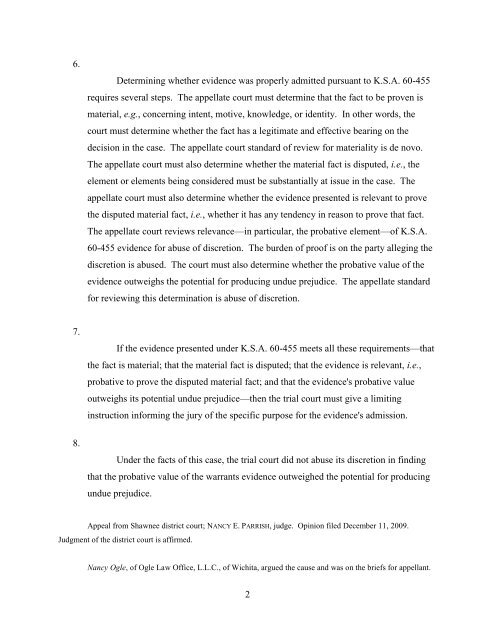Kansas Supreme Court - 99961 - State v. Hollingsworth
Kansas Supreme Court - 99961 - State v. Hollingsworth
Kansas Supreme Court - 99961 - State v. Hollingsworth
You also want an ePaper? Increase the reach of your titles
YUMPU automatically turns print PDFs into web optimized ePapers that Google loves.
6.<br />
Determining whether evidence was properly admitted pursuant to K.S.A. 60-455<br />
requires several steps. The appellate court must determine that the fact to be proven is<br />
material, e.g., concerning intent, motive, knowledge, or identity. In other words, the<br />
court must determine whether the fact has a legitimate and effective bearing on the<br />
decision in the case. The appellate court standard of review for materiality is de novo.<br />
The appellate court must also determine whether the material fact is disputed, i.e., the<br />
element or elements being considered must be substantially at issue in the case. The<br />
appellate court must also determine whether the evidence presented is relevant to prove<br />
the disputed material fact, i.e., whether it has any tendency in reason to prove that fact.<br />
The appellate court reviews relevance—in particular, the probative element—of K.S.A.<br />
60-455 evidence for abuse of discretion. The burden of proof is on the party alleging the<br />
discretion is abused. The court must also determine whether the probative value of the<br />
evidence outweighs the potential for producing undue prejudice. The appellate standard<br />
for reviewing this determination is abuse of discretion.<br />
7.<br />
If the evidence presented under K.S.A. 60-455 meets all these requirements—that<br />
the fact is material; that the material fact is disputed; that the evidence is relevant, i.e.,<br />
probative to prove the disputed material fact; and that the evidence's probative value<br />
outweighs its potential undue prejudice—then the trial court must give a limiting<br />
instruction informing the jury of the specific purpose for the evidence's admission.<br />
8.<br />
Under the facts of this case, the trial court did not abuse its discretion in finding<br />
that the probative value of the warrants evidence outweighed the potential for producing<br />
undue prejudice.<br />
Appeal from Shawnee district court; NANCY E. PARRISH, judge. Opinion filed December 11, 2009.<br />
Judgment of the district court is affirmed.<br />
Nancy Ogle, of Ogle Law Office, L.L.C., of Wichita, argued the cause and was on the briefs for appellant.<br />
2

















